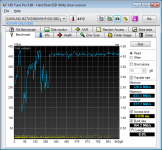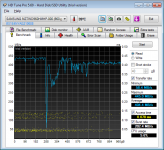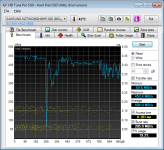jtr1962
Storage? I am Storage!
I bought three of these back in 2016. I've had no issues with them except for the fact that reads become slower in parts of the drive where data hasn't been refreshed in a while. For example:

For now my kludge for fixing this has been to defragment the drive. I use MyDefrag and the "System Disk Monthly" script which ends up refreshing virtually all the files on the disk. Of course, the only problem with this is that you end up with a few hundred GB of drive writes. And it doesn't fix the problem in areas of the disk which don't happen to be written to. However, the end result is typically much better than before:

Anyway, I recall my 500GB Samsung 840 had a similar issue until Samsung fixed the firmware. Has anyone heard of any solutions (either firmware upgrades or software similar to the Samsung Magician) which might work instead of defragging the drive? Besides the extra drive writes, the defragging routine takes something like a day and half to run. Note that Samsung Magician doesn't recognize these drives so that's out.

For now my kludge for fixing this has been to defragment the drive. I use MyDefrag and the "System Disk Monthly" script which ends up refreshing virtually all the files on the disk. Of course, the only problem with this is that you end up with a few hundred GB of drive writes. And it doesn't fix the problem in areas of the disk which don't happen to be written to. However, the end result is typically much better than before:

Anyway, I recall my 500GB Samsung 840 had a similar issue until Samsung fixed the firmware. Has anyone heard of any solutions (either firmware upgrades or software similar to the Samsung Magician) which might work instead of defragging the drive? Besides the extra drive writes, the defragging routine takes something like a day and half to run. Note that Samsung Magician doesn't recognize these drives so that's out.



